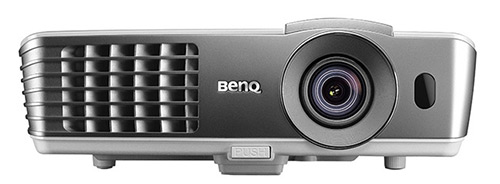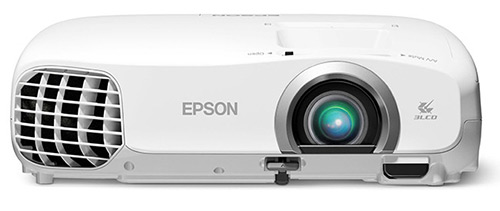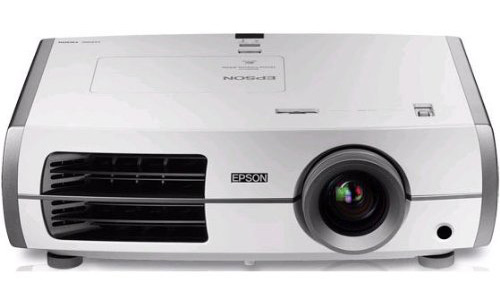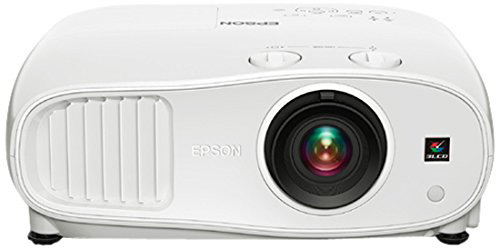Dear Big Picture Big Sound,
My old home theater front projector is not working as well these days. I replaced the bulb about a year ago but it's already starting to get noticeably dimmer and a little glitchy. I think I'd like to start fresh with a new projector. What's the best projector I can get for home theater/HDTV use for under $1,000 (preferably much less)? And do I need any lens shift if I have a pretty straight shot from my back wall to the screen? I just need to adjust it so it's a little left of straight center. Also, can I get 1080p resolution and 3D in this price range?
Thanks,
-Marco
Hi, Marco,
There are some great projectors out there these days for not a lot of money. Your two basic choices in this price range are 3-chip LCD and single-chip DLP. DLP projectors tend to have better black levels than LCD projectors (for the same price). But because single-chip DLP projectors use something called a "color wheel" to create a color picture, they can create an effect called "RBE" (Rainbow Effect). This is a rainbow image distortion that appears during fast-moving scenes. Some people are more sensitive to this than others and some don't even notice it at all.
If you are very flexible with your projector placement (you can put the projector almost anywhere in the room), then you probably won't need lens shift or advanced zoom capabilities (more on that later). In this case, there are some great choices available for under $700 street price.

The BenQ W1070 projector is a single-chip DLP model with two HDMI inputs, PC and composite video inputs, Full HD 1080p resolution, a rated brightness of 2,000 Lumens and 3D capability. It offers nice color accuracy and great black levels, but can create that RBE which some people find annoying. It uses DLP-Link glasses for 3D which can be a little larger and more expensive than the newer Bluetooth/RF 3D glasses. It offers limited zoom (1.3X manual) and no lens shift. If you have any trouble finding it, the newer HT1075 is similar but with higher brightness (and a slightly higher price tag).
The Epson Home Cinema 2000 is a 3-chip LCD projector with two HDMI inputs, PC and composite video inputs, 1080p resolution, 1,800 Lumens of brightness and 3D capability. Its black levels are very good though not as deep as the BenQ. But because it's a 3-Chip LCD projector -- and not single-chip DLP -- you won't get any rainbow effect. The Home Cinema 2000 offers very limited zoom (1.2x manual) and no lens shift. This projector is very inexpensive right now (under $600) and is compatible with low-cost universal RF 3D glasses (under $20/pair for the latest pair from Samsung) so it offers excellent value. BPBS co-founder Joe Lozito and I each use a Home Cinema 2000 projector for our backyard movie nights.

The main drawback to these two projectors are that they have limited zoom range and no horizontal or vertical lens shift. This means you have to place the projector at a very specific location relative to your screen. The projector has to be on a direct line with the horizontal midpoint of the screen and the vertical placement requirements are also pretty rigid.
In the case of the Home Cinema 2000, I did a ceiling mount for it and found that the projector had to be almost exactly 9" below the ceiling and about 8-10 feet from the screen in order to fill my 92-inch screen with a squared-off image. You can read more about that in my review of the Epson projector mount. If you're just projecting against a blank wall, or haven't installed your screen yet, then this won't be as critical but I had to hit a specific size screen that was already mounted on the wall. There is some digital keystone adjustment to square the image off vertically if you need that, but then you lose some resolution. Similar placement requirements apply to the BenQ.
So if you are going to be hitting a specific screen or want your image to be a particular size, and you're more limited in where you can place the projector, then you might consider getting a projector with lens shift and a wider zoom range. The wider zoom range allows you to place the projector closer (or further) from the screen and still get the right size image. Lens shift allows you to shift the entire image up and down, left and right so you don't need to have your projector exactly centered or at a particular height in order to get a correctly sized and geometrically accurate picture.
If you think you're going to need this flexibility and still want to keep the price down under $1000, I'd recommend the Epson Powerlite Home Cinema 8345 or 8350. Each of these has a 2.1:1 zoom lens as well as a generous amount of lens shift, both left/right and up/down. This should allow you to place your projector on a shelf on a back wall a little off-center from the screen and still get a perfectly squared off picture (assuming your room is not too large of course).

To make sure you are getting the right projector for the job, we'd recommend using the excellent throw distance calculator tool on Projector Central's web site. With this tool, you plug in your desired screen size and projector model, and the calculator shows you the full range of throw distance (distance from projector to the screen).
Both the 8345 and 8350 offer 1080p resolution, 2 HDMI inputs plus PC and composite video, 2.1:1 zoom and flexible lens shift options. The 8345 offers 1,800 Lumen brightness and 25,000:1 contrast while the 8350 is rated for 2,000 Lumens and 50,000:1 contrast (though these numbers are manufacturer-provided and should be taken with a grain of salt). But neither the 8345 nor the 8350 can do 3D. The 8345 is available for under $800 and the 8350 is currently about $100 more.
If 3D is important to you and you want to stick with a 3-LCD projector that has a zoom lens as well as lens shift, then you might have to spend a bit more to get something like the Epson Home Cinema 3000 (currently $1150 on Amazon). This one offers a whopping 2,300 Lumens of brightness, wide lens shift, 2 HDMI ports, PC and composite video inputs. It uses the newer 3D RF glasses that you can pick up for under $20/pair. Its zoom lens is slightly less powerful than the 8345 or 8350 (1.6:1) but this should still offer a fairly wide range of throw distances.

I hope that helps and good luck with your new projector!
Related Articles: